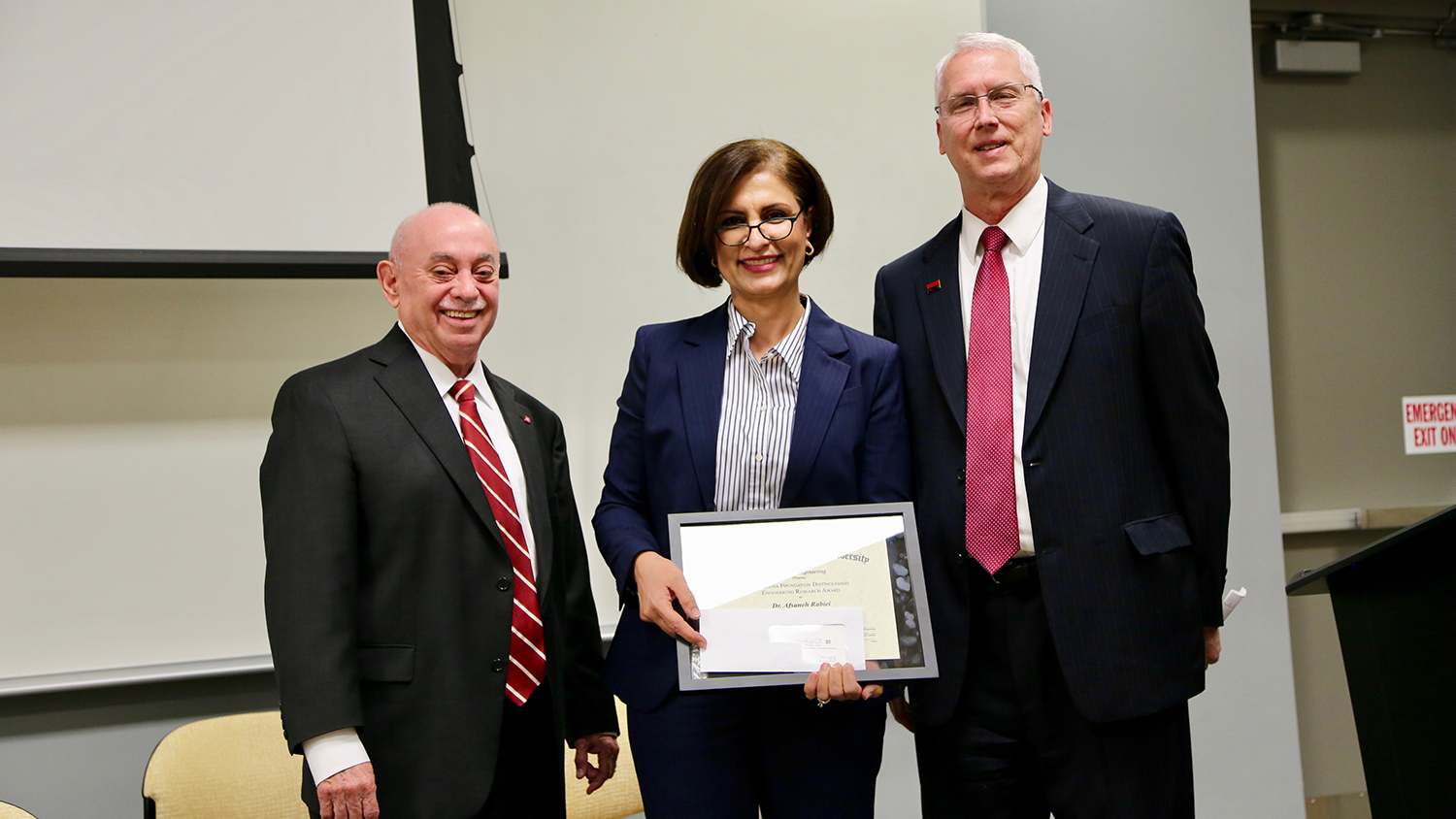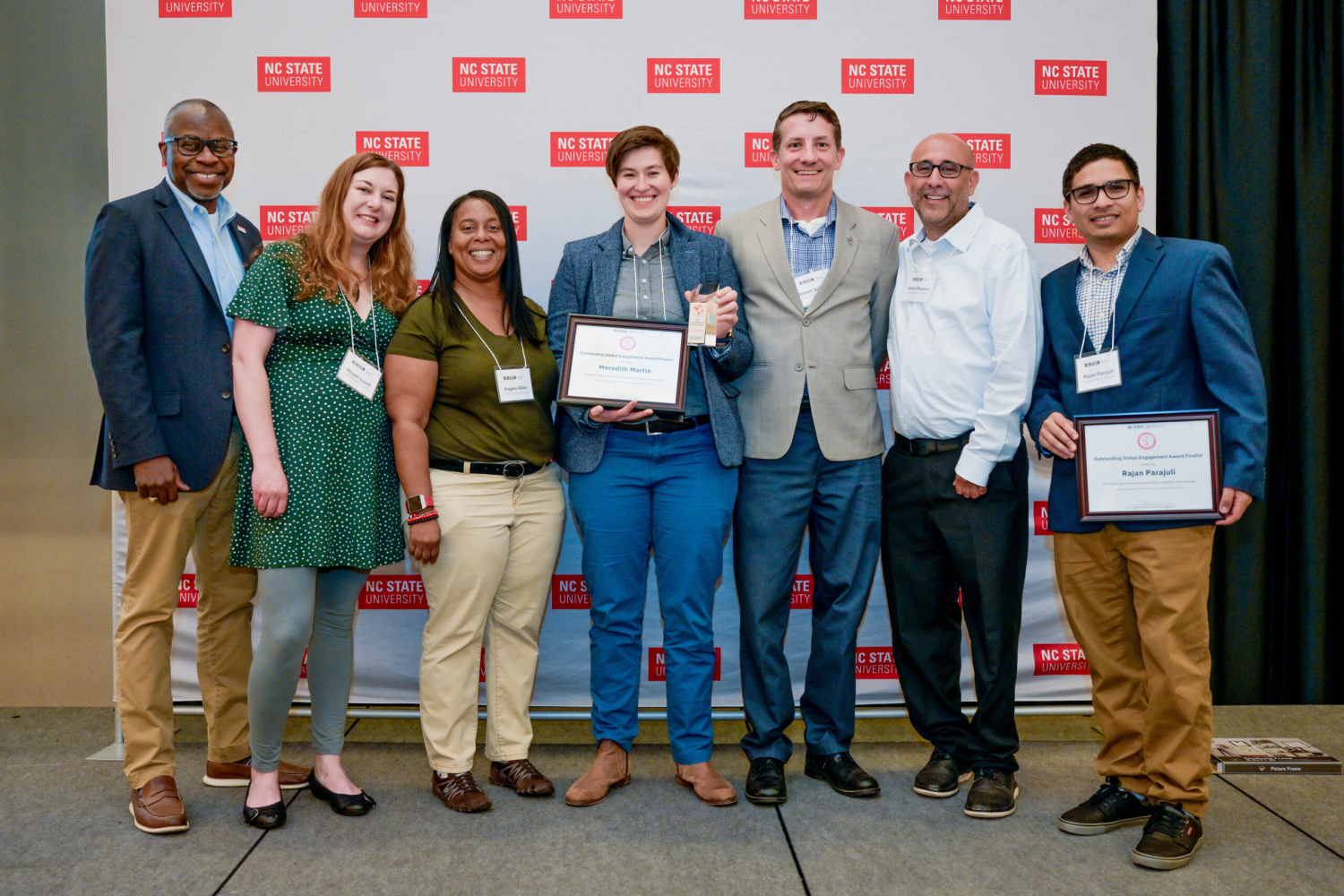Rabiei, Williams receive 2019 Alcoa Foundation Awards

The 2019 Alcoa Foundation Engineering Research Awards were presented to Dr. Afsaneh Rabiei, professor in the Department of Mechanical and Aerospace Engineering, and Dr. Cranos Williams, associate professor in the Department of Electrical and Computer Engineering (ECE), at the spring faculty meeting of the College of Engineering at North Carolina State University.
Rabiei received the Alcoa Foundation Distinguished Engineering Research Award, made to a senior faculty member for research achievements over a period of at least five years at NC State. Williams was awarded the Alcoa Foundation Engineering Research Achievement Award, which recognizes young faculty members who have accomplished outstanding research achievements during the preceding three years.
Afsaneh Rabiei
Rabiei is known internationally as a leader of research on composite metal foams, which as a lightweight material capable of high energy absorption has outstanding properties as armors, car bumpers and biomedical implants. Additionally, she has made unique contributions to her field through the development of multiple novel materials such as metallic bubble wraps and smart coatings for biomedical implants. These materials and processing techniques for coating biomedical implants have led to breakthrough methods that decrease infection risk and speed up healing time for patients after surgery.
In the past five years, she has managed six projects with a budget of more than $3 million, with funding from the federal Department of Energy, Department of Transportation, National Institutes of Health, NASA and others. Her contract with the Joint Aircraft Survivability Program under the Department of Defense is the first indefinite-delivery, indefinite-quantity contract NC State has ever entered.
She has authored 66 research articles and research review articles, as well as 38 conference proceedings papers and papers in edited volumes. She has authored and edited seven books and one book chapter. She holds 10 patents, with three licensed for commercialization into a small startup company and another three promoted through the NC State University Chancellor’s Innovation Fund and recently assigned to a startup she has established for the commercialization of composite metal foams. Her work is recognized among peers and in the media, and it has been covered by Huffington Post, Science Friday, Army Times, Fox News and the New York Post, among other publications.
Cranos Williams
Within ECE, Williams is leading an interdisciplinary research effort merging plant sciences and engineering, single-handedly creating a new research discipline. His breakthrough research has led to the development of computational approaches that use high-throughput data to identify regulators of plant stress responses. His contributions have improved understanding of the interactions of biomolecular, physiological and structural processes that affect plant growth, development and adaptation, and he is leading the way as an expert in both plant biology and systems modeling. His research has led to findings that will improve crop tolerance, increase the efficiency of biofuel production and create strategies for addressing food security.
In the last three years, Williams has published eight journal articles, worked on eight active research grants with award funding totaling more than $8 million, given seven external invited talks, chaired the committees of seven Ph.D. students, mentored 14 undergraduate research students and graduated one Ph.D. student.
He also received a planning grant from the National Science Foundation (NSF) and is leading a submission to NSF’s call for fourth-generation engineering research centers. His vision for the Engineering Research Center for Rapid Innovations in Systems Engineering and Agricultural Sustainability — also known as RiseEngAg — focuses on the need for long-term global food security by improving plant resilience, produce quality and consumer food safety. He has assembled a diverse team across seven universities, including five land grant universities and three minority-serving institutions, with the goal of developing an inclusive center that drives research and innovation. Williams also served as subcommittee co-chair for the Plant Data Sciences Research Thrust for the North Carolina Plant Science Initiative, an interdisciplinary initiative that addresses challenges facing North Carolina agriculture.
- Categories:


